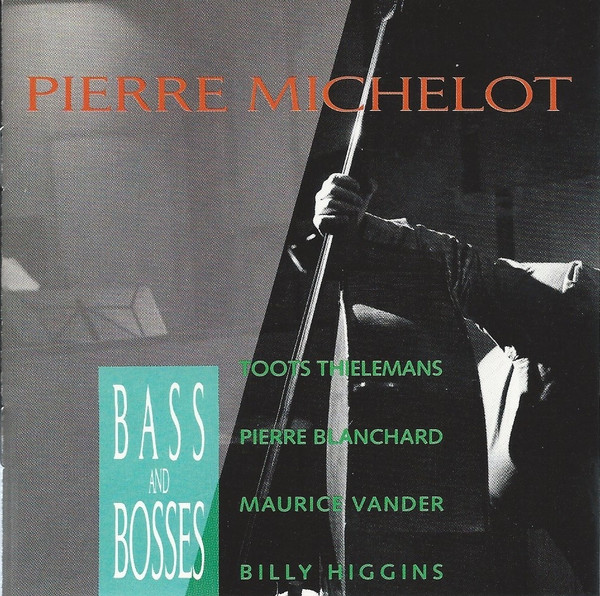Startseite › Foren › Über Bands, Solokünstler und Genres › Eine Frage des Stils › Blue Note – das Jazzforum › Deep Talk – Der Bass im Jazz › Antwort auf: Deep Talk – Der Bass im Jazz
Ich hole das mal aus dem Hörfaden hier rüber:
gypsy-tail-wind
Pierre Michelot – Bass and Bosses | Noch so ein Prä-Gitanes Polygram-Frankreich-Album, im Dezember 1989 aufgenommen und 1990 erschienen, mit Maurice Vander (p), Billy Higgins (d), Toots Thielemans (harm) und Pierre Blanchard (v). Produziert haben Allard/Michelot, Richard und Liner-Notes-Übersetzer (und wohl „Gango“, wie das hierzulande heisst, als „Mädchen für alles“) Martin Davies werden mit besonderem Dank versehen. Das ist ruhige, nachdenkliche Musik. Michelot hält sich natürlich zurück – kein Grund für Pyrotechnik, bloss weil er der Leader ist. Er war ja auch Komponist/Arrangeur, nicht zuletzt für Chet Baker und natürlich für sein „Round About a Bass“ von 1963, das in der Jazz in Paris-Reihe wieder aufgelegt wurde. Vander klingt hier für meine Ohren hervorragend … da bin ich irgendwie eher kein Fan (das Trio-Album von 1961 mit Michelot und Kenny Clarke ist aber schon ziemlich gut). Das passt gut zum John Lewis-Album auf Polygram, das ein Jahr früher auch mit Michelot entstand … und es passt wohl auch ganz gut zum Escoudé/Michelot-Album mit Hank Jones und Kenny Washington (November 1990, nochmal fast ein Jahr später), das morgen mal wieder in den Player kommt.
soulpope
Pierre Michelot war ja von Haus aus kein „Pyrotechniker“ und sein Understatement – falls er nicht gut aufgenommen wurde – manchmal fast ein Nachteil ….
gypsy-tail-wind
Alain Gerber arbeitet das in den Liner Notes ganz schön heraus, finde ich:What Ieoh Ming Pei attempted, Pierre Michelot brought to a successful conclusion: he is the architect of a transparent pyramid. There is nothing more imposing, nothing more limpid, than the lines of his bass; nothing airier, and yet with deeper roots, nothing slighter, yet more substantial. When he plays, he displaces mountains that move with the grace of Fred Astaire. Wood or water, marble or crystal, we hardly know which metaphor to choose.
Aided and abetted by technology, bassists who once could only be sensed when they ceased slapping have now learned to make themselves heard. The „presence“ of an Eddie Gomez, for example, is overpowering for those who risk his accompaniment, if their eloquence is not at least equal to his own. Michelot, however, with the simple majesty that comes from a long experience, represents the school of modesty.
Which is not to say he is timid. Nor is the Michelot school of playing a slight one, or a strictly functional method (as might be said, with sometimes relative exactitude, of the playing of Tommy Potter with Bird). It is not even a school of discretion, for Michelot, despite all appearances, is everywhere – and everywhere he sings his own song, which is unlike any other. If one needs convincing of this, one has only to listen to the accompaniment he provides for the soloists on GODCHILD, or on QUARTE’S FEVER – striking examples, but not the only ones.
His entire art consists of enhancing music with a fourth dimension, indissolubly mixed with the other three: harmony, rhythm and – one can’t insist enough on this – melody. His is a crucial, but extraordinarily subtle contribution. The poorly-educated listener may be unaware of this but he would be ill at ease if suddenly deprived of it. As for the musicians in the band, they would see their field of imagination shrink, instead of finding themselves able to tear away from familiar ground, like [Maurice] Vander in GODCHILD, [violinist Pierre] BLANCHARD in JITTERBUG WALTZ, Toots [Thielemans] in THE PEAOCKS and Billy Higgins the exemplary duet BLUES IN THE CLOSET.
A great bassist is one who, in the same gesture, places landmarks and also gives the keys to freedom. In order to do this, he must cultivate; and put into practice, second after second, the virtues of the composer. And so it should come as no surprise that Michelot puts his name – all too seldom, to my taste – to themes and arrangements that are quoted by historians and musicographers alike. No-one has forgotten CHET, ELEPHANT GREETN, and the whole album „ROUND ABOUT A BASS“. Through the progressive glides of QUARTE’S FEVER, the kind of Parisian street-bop invented on BIG MEETING, the arrangement of the Miles Davis solo (from the Capitol sessions) in GODCHILD, the accordion „synthesized“ by the violin and harmonica in JITTERBUG, through these and a dozen other fins, turns of phrase, nods, and reminiscences, „BASS AND BOSSES“ draws this adventure successfully into new territory.
And when, in turn, Maestro Pierre steps forward – „easily the best post-bop bassist that Europe has produced,“ as Brian Priestley said without any risk of error – the intensity and continuity of his inspiration sets him apart – his feeling for a story, in short – and turns each of his interventions into finished object. To the point where it is not improper, here and there (especially in A CHILD IS BORN) to recognize models of spontaneous composition.
Viel finde ich davon nicht in der Tube, aber hier ist der Opener „The Peacocks“:
„Quarte’s Fever“ wurde bei Gitanes auf „Ya Know“ von Lou Levy nochmal hervorgeholt – da war Michelot einer von zwei Bassisten.
--
"Don't play what the public want. You play what you want and let the public pick up on what you doin' -- even if it take them fifteen, twenty years." (Thelonious Monk) | Meine Sendungen auf Radio StoneFM: gypsy goes jazz, #169: Pianistinnen im Trio, 1984–1993 – 13.01.2026, 22:00: #170 – 19.02.2026, 20:00; #171 – 10.03.2026, 22:00; #172 – 14.04.2026, 22:00 | Slow Drive to South Africa, #8: tba | No Problem Saloon, #30: tba